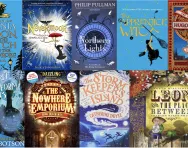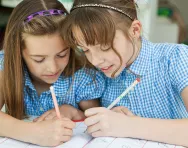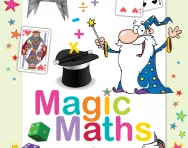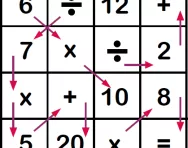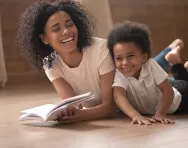Important update from TheSchoolRun
For the past 13 years, TheSchoolRun has been run by a small team of mums working from home, dedicated to providing quality educational resources to primary school parents. Unfortunately, rising supplier costs and falling revenue have made it impossible for us to continue operating, and we’ve had to make the difficult decision to close. The good news: We’ve arranged for another educational provider to take over many of our resources. These will be hosted on a new portal, where the content will be updated and expanded to support your child’s learning.
What this means for subscribers:
- Your subscription is still active, and for now, you can keep using the website as normal — just log in with your usual details to access all our articles and resources*.
- In a few months, all resources will move to the new portal. You’ll continue to have access there until your subscription ends. We’ll send you full details nearer the time.
- As a thank you for your support, we’ll also be sending you 16 primary school eBooks (worth £108.84) to download and keep.
A few changes to be aware of:
- The Learning Journey weekly email has ended, but your child’s plan will still be updated on your dashboard each Monday. Just log in to see the recommended worksheets.
- The 11+ weekly emails have now ended. We sent you all the remaining emails in the series at the end of March — please check your inbox (and spam folder) if you haven’t seen them. You can also follow the full programme here: 11+ Learning Journey.
If you have any questions, please contact us at [email protected]. Thank you for being part of our journey it’s been a privilege to support your family’s learning.
*If you need to reset your password, it will still work as usual. Please check your spam folder if the reset email doesn’t appear in your inbox.
What children can learn from magic tricks
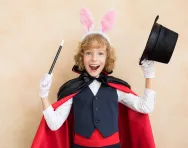
From The Worst Witch to Harry Potter, children’s books, films and TV series are filled with wonder and wizardry. It’s no surprise, then, that many kids are captivated by magic, whether they’re performing their own tricks or watching other people’s.
‘Magicians appear to achieve the impossible, and people love that sense of escapism, regardless of age,’ says Professor Richard Wiseman, a psychologist at the University of Hertfordshire and member of the Magic Circle.
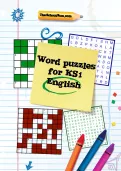
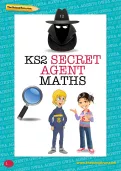
Claim four puzzle packs!
- Word Puzzle Packs
- Numeracy Puzzle Packs
- Challenging and exciting | Boost key skills
Magician Duncan William, who performs children’s shows as William the Wizard, agrees. ‘The world is full of magic for very young children, whether they’re admiring a beautiful pebble or seeing snow for the first time,’ he explains.
‘As we get older, we lose that sense of wonder, so watching or performing magic takes children back to that “wow moment” where something extraordinary opens up in front of them.’
But learning magic tricks isn’t just about being entertained or impressing friends. Research by Prof Wiseman has shown that magic can help children become more sociable, confident and creative, with knock-on benefits for their success at school.
What can children learn from magic?
Watching and learning to perform magic has many benefits for kids, and can help them develop skills that will help them at school and beyond.
Creativity
Prof Wiseman’s study found that children who were taught a simple magic trick and then asked to take a creativity test that involved coming up with multiple uses for an everyday object scored higher on the test than those who weren’t taught the trick.
‘When you watch a magic trick, you see something that appears to be impossible,’ Prof Wiseman explains. ‘That experience expands the mind and helps people think about different ways of looking at the world, which encourages creative thinking.’
This creativity can benefit children in the classroom and beyond, whether they’re writing stories or poems, working on an art project or devising a drama script. ‘It’s always good to be able to adopt different perspectives and see a situation in lots of different ways,’ says Prof Wiseman.
Critical thinking
Alongside creative skills, magic can also help children develop critical thinking skills.
Although tricks and illusions may seem impossible and incredible, they’re actually very logical. They involve a fixed set of steps that lead to a single, consistent (and breath-taking) outcome that works every time.
Unpicking how a trick works – whether they’re learning it themselves, or watching someone else’s – means children have to think logically and laterally, which develops their problem-solving ability.
Perseverance
The saying ‘practice makes perfect’ may be a cliché, but it’s essential if children want to learn to perform magic tricks.
‘There’s no quick fix with magic: if you don’t practise over and over again, it’s unlikely to work,’ says Duncan. ‘Learning a trick helps to improve children’s concentration and focus, and teaches them that repetition leads to perfection.’
This determination will benefit your child at school and beyond, whether they’re working on a difficult maths challenge, learning to ride a bike, or practising a musical instrument.
Resilience
Resilience – the ability to bounce back from failure and try again – is a vital skill for children. Kids who are resilient don’t dwell on their mistakes; rather, they seem them as learning opportunities.
Learning magic tricks can increase children’s resilience and grit, as they have to keep working at them if they’re to perform them successfully.
‘It’s important not to worry about failing,’ says Prof Wiseman. ‘Magicians make mistakes all the time, but they learn from them and improve.’
Social skills
Successful magicians don’t just know how to do tricks; it’s equally important to engage the audience. Learning to do this is a good way for children to hone their social skills.
‘When a child stands up in front of an audience, they become more confident,’ Prof Wiseman explains. ‘A good performer interacts with their spectators and thinks about how the illusion looks from someone else’s point of view, and this helps them develop social skills like empathy.’
Learning magic can also boost children’s self-esteem. ‘A lot of magicians say they were quite shy as a child,’ Duncan says. ‘If your child learns magic tricks, they have something cool to show their friends. It breaks the communication barrier and helps them be accepted by their peers.’
Presentation skills
Being able to present or perform in front of classmates is part and parcel of school life, and learning magic can help children refine their presentation skills.
‘They have to learn to project their voice and seem authoritative, without losing that light-hearted sense of fun,’ Duncan explains. ‘They need to use their verbal and physical skills in harmony.’
How to teach children magic
There are lots of great ways for children to learn magic tricks, including magic sets, books, online workshops and YouTube videos.
‘The internet gives kids easy access to magic, but nothing is as creative as reading a book,’ says Duncan. ‘If you watch a performer doing a trick, you copy their performance, whereas if you read it in a book, you have to work it out in your own mind and develop your own performance.’
Certain items – such as a deck of cards and a set of coins – are fundamental to every magician’s kit. You can also find lots of tricks and gimmicks to buy online, such as rigged packs of cards, fake money and magic wands that your child can use in their illusions.
While young children are often spellbound by magic and keen to learn their own tricks, Duncan suggests that age seven plus is a good time to start practising magic. ‘Before this age, children get enough of a sense of wonder from the world around them, but from around seven, they really start to appreciate illusions,’ he explains.
Younger children may also struggle with following instructions, and may not have the quick lateral thinking skills, confidence or dexterity to perform tricks that reel in the audience.
Of course, a magician never reveals their secrets, but Prof Wiseman suggests that most tricks work because they’re simple but clever. ‘It’s a good idea for children to try lots of different illusions and see which ones suit their personality and ability.
‘Think about how it looks from the audience’s perspective, and then think about making it more entertaining. Could your child make it funny, or tell a story, or involve a friend in the trick?
‘Often, it’s quite easy to learn how to perform a trick, but turning that trick into a positive experience for everyone can be more challenging. Knowing how to present an illusion and make people have a good time is a real skill, and takes lots of hard work!’
9 great magic resources for kids

Fifty Greatest Card Tricks Set, £13.99, Marvin’s Magic (age 8+)
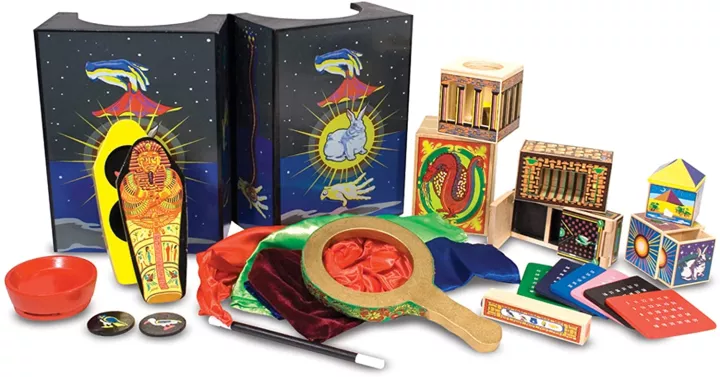
Deluxe Magic Set, £34.99, Melissa & Doug (age 7-11)

Magic in a Box Gift Set, £8.78, Global Gizmos (age 3+)

Everyday Magic for Kids by Justin Flom, £9.99, Running Press Kids (age 8-11)

Kids’ Magic Secrets by Loris and Martin Bree, £9.99, Marlor Press (age 9-12)
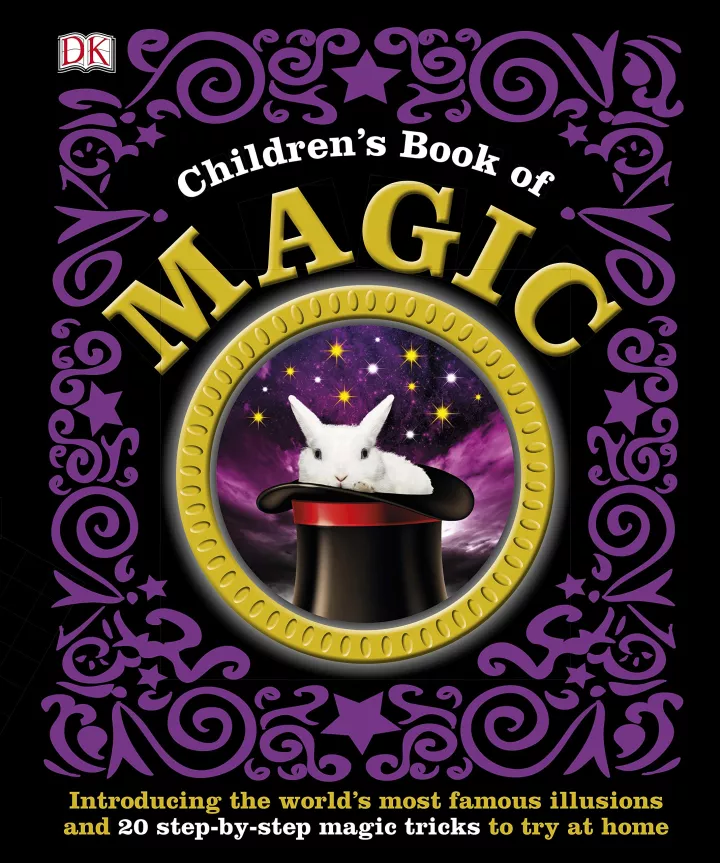
Children’s Book of Magic, £14.99, DK Books (age 7-11)

Retro Magic Box, £7.99, Kandy Toys (age 6+)

My First Magic Showcase, £17.47, Marvin’s Magic (age 6+)

